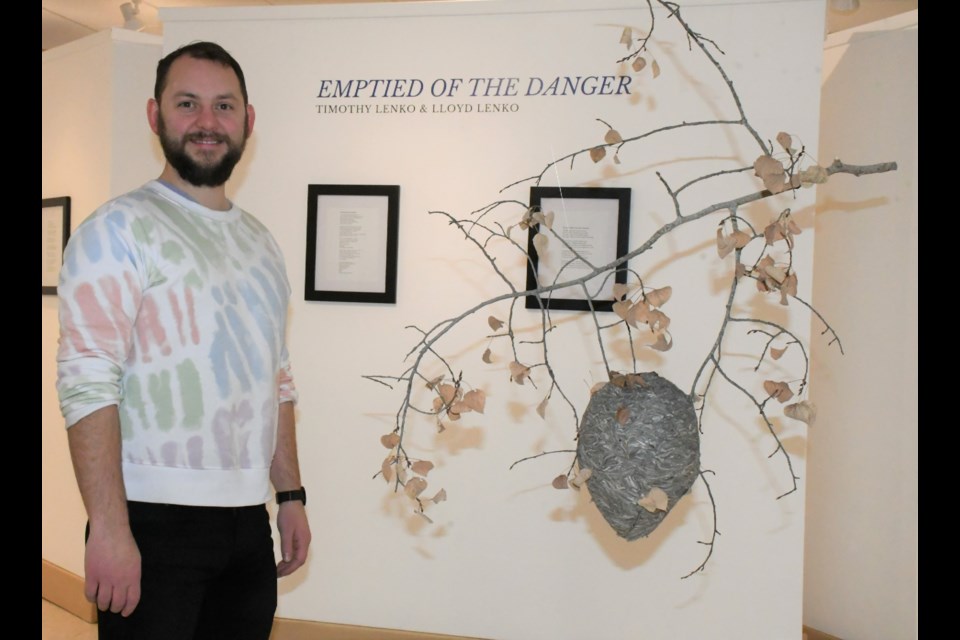Most people would run away if they came across a wasp nest, but a father and son have found a way to see beauty in the imposing structures.
“Emptied of the Danger” by Lloyd and Timothy Lenko is the latest exhibit in the first-floor gallery at the Moose Jaw Cultural Centre. It features eight empty wasp hives that Lloyd collected and eight poems Timothy wrote to accompany each nest.
The exhibit began in mid-November and ends on Thursday, Dec. 22.
According to the exhibit’s description, the two lived together for 16 years in a strained home that featured an intricate tapestry of misunderstanding, love, confusion and resilience. Timothy only acquired a sympathetic view of his father after he left home, while it took time to see their shared love of beauty, disdain for pain, a conviction of faith, and fear of what others might do.
An eye for beauty
Lloyd was a carpenter and a general handyman, such as a farmer, a maintenance man at the hospital and a manager of an apiary, explained Timothy. Even semi-retired, the elder Lenko continues to look for things to do.
“He has an eye for really beautiful things,” the younger Lenko said.
During the fall of 2021, there were more wasp nests than usual in the woods near the farm. Lloyd saw these as he drove from job to job or to visit friends and waited to see if they were abandoned before he collected them and hung them in his shop.
As the Lenko family gathered for Thanksgiving and Christmas, the family patriarch showed them what he had found.
Combining interests
In July, Timothy began working at the Cultural Centre and noticed the various displays of the gallery. He wanted to find a project to share but was unsure what, considering his work is mainly writing, singing and theatre. However, inspiration struck him when his dad showed him newer nests he had collected.
“… It struck me that they were beautiful and well worth sharing. So, I started thinking about how my writing and his hives could intersect,” he said. “That set me off on a journey to explore this relationship with him over the years … .
“He keeps finding beauty in these things — like the nests — so I took the opportunity to look for what unexpected beauty there might be in him that I never noticed before.”
Inspiration for poems
When you grow up with someone, you see their rough edges and drawbacks, he explained, while he saw all the perceived bad sides of his father. However, he has also noticed glimmers of beauty.
For example, his father commented that a road had been moved, preventing people from driving past a scenic valley. So, Timothy wrote a poem about that experience.
“I did not expect him to notice something like that,” he said, adding this was a cathartic and worthwhile topic to explore.
The artist noted that extending grace can be a restorative experience and a healthy act whenever there is a relationship featuring love and frustration. He also feels grateful that he can combine his writing with his dad’s eye for natural beauty.
Another poem features Timothy’s experiences working on the family’s honey farm and what it was like to discover his father was a skillful teacher, a patient supervisor and a generous employer.
“I really appreciated that and learned a lot from that experience. I was shaped by him and mom at the honey farm,” he continued. “That was beauty I did not always pay attention to.”
Enjoyment of poetry
Timothy has had a strong interest in poetry as an adult, while his friends introduced him to poets such as Malcolm Guite and Gerard Manley Hopkins. He took inspiration from their works and looked for how their forms could guide his poems so he could help people find beauty.
“When I was writing these ones in particular, I thought of particular moments with my dad that had a strong emotional impact,” he said.
Such emotional events included seeing his dad run for the first time, his father being unable to say he was proud of his son, his dad’s comments about the road being moved, and working on the farm.
Appreciating nature
Of the eight hives, Lenko likes the one that accompanies his poem about the road because of how it sits in the branches. He also appreciates the hive that goes with a haiku because it’s the smallest and its branches seem haunting.
Meanwhile, he thought it was difficult to pick his favourite poem, although he singled out one written in the shape of a bee and the poem about his dad running because it was the first one he wrote, is based on a jazz song and is the most visceral of the eight.
“I love it,” he added.
A suitable title
Timothy called his exhibition “Emptied of the Danger” because wasp nests are always a signal of danger and a reason to run away, he explained. However, they no longer pose a threat when the insects, which allows others to appreciate them up close.
Meanwhile, each hive has its own texture, colour, lines, and shape, while each is attached to a unique branch with leaves.
For Timothy, the nests symbolize the experience of moving away from home, taking a step back, and no longer feeling the frustration of living with parents. Moreover, he can appreciate who his parents are and what the relationship was like — with some distance from any negative feelings that may linger.
The Cultural Centre is located at 217 Main Street North.




